Heating Furnace Maintenance: Essential Tips to Keep Your System Efficient and Reliable
A heating furnace is one of the most important appliances in your home during the colder months. It keeps your indoor spaces warm, comfortable, and safe when temperatures drop. But like any mechanical system, a furnace needs proper care to operate at its best. Heating furnace maintenance is essential for reducing energy costs, preventing breakdowns, and ensuring your home stays cozy all winter long. Neglecting maintenance can lead to reduced efficiency, costly repairs, and even complete system failures.
In this article, we’ll share essential heating furnace maintenance tips that will help keep your system efficient, reliable, and ready for the winter season.
1. Schedule Annual Professional Inspections
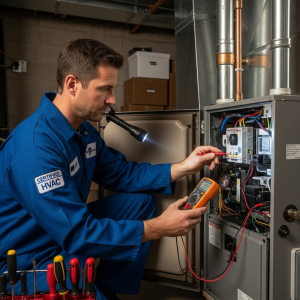
One of the best ways to keep your furnace running smoothly is to schedule an annual tune-up with a licensed HVAC technician. During the inspection, the professional will check components such as the heat exchanger, burners, blower motor, and safety controls. They can also detect potential issues early, helping you avoid expensive emergency repairs later.
2. Replace or Clean Air Filters Regularly
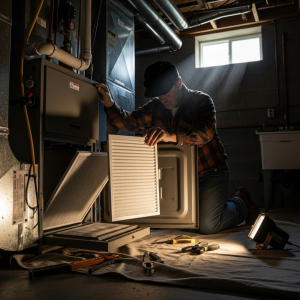
Dirty air filters are one of the most common causes of furnace inefficiency. When dust and debris clog the filter, airflow is restricted, making the system work harder to heat your home. This not only increases energy consumption but also shortens the lifespan of the furnace.
- Recommendation: Check your filter every month and replace it every 1–3 months, or as recommended by the manufacturer.
3. Clean Vents and Ductwork

Over time, dust and debris can build up in your vents and ductwork, reducing airflow and lowering system performance. Clean vents with a vacuum and ensure that furniture or curtains aren’t blocking airflow. For deeper cleaning, consider hiring a professional duct cleaning service every few years.
4. Inspect the Thermostat

Your thermostat plays a key role in controlling your heating system’s efficiency. Test it regularly to ensure it’s reading the correct temperature and responding to adjustments. If you still have a manual thermostat, upgrading to a programmable or smart thermostat can help you save on energy costs by automatically adjusting temperatures when you’re away or asleep.
5. Check for Unusual Noises or Smells
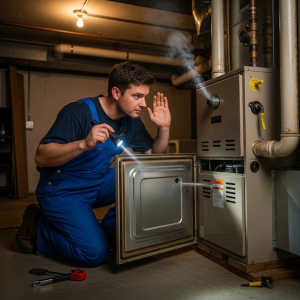
Furnaces typically produce a low humming sound when operating. However, loud banging, grinding, or squealing noises can indicate mechanical issues such as loose parts or a failing blower motor. Similarly, strange odors like burning smells or musty scents should be addressed immediately to prevent safety hazards.
6. Keep the Area Around the Furnace Clear
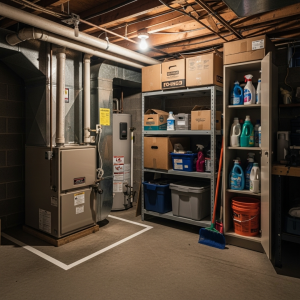
For both safety and efficiency, always maintain a clear space around your furnace. Keep flammable materials, boxes, and cleaning supplies at least three feet away. Adequate airflow around the unit allows it to operate more efficiently and prevents overheating.
7. Seal Air Leaks in Your Home
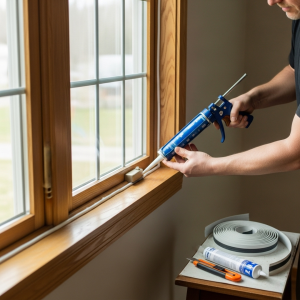
Even a perfectly maintained furnace can waste energy if your home has air leaks. Inspect windows, doors, and attic spaces for gaps, and seal them with weatherstripping or caulking. This will keep warm air in and cold air out, reducing the workload on your furnace.
8. Monitor Carbon Monoxide Levels
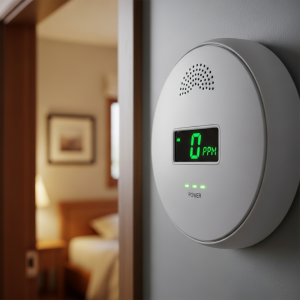
Gas furnaces can produce carbon monoxide (CO) if not vented properly. Install a carbon monoxide detector near sleeping areas and test it regularly. If the alarm sounds, turn off your furnace, open windows, and call a professional immediately.
Proper heating furnace maintenance is the key to keeping your system efficient, reliable, and safe throughout the cold season. By following these tips along with scheduling regular professional inspections you can enjoy consistent warmth, lower energy bills, and fewer unexpected repairs. For trusted service and expert care, Benner Plumbing & Heating Ltd. is here to handle all your heating needs and ensure your furnace runs at its best year after year.